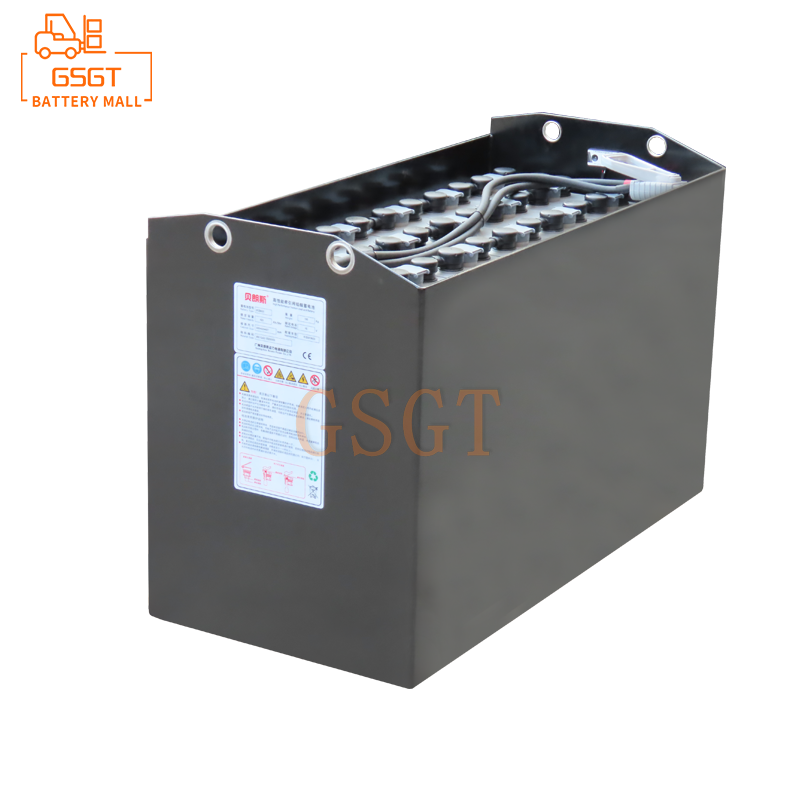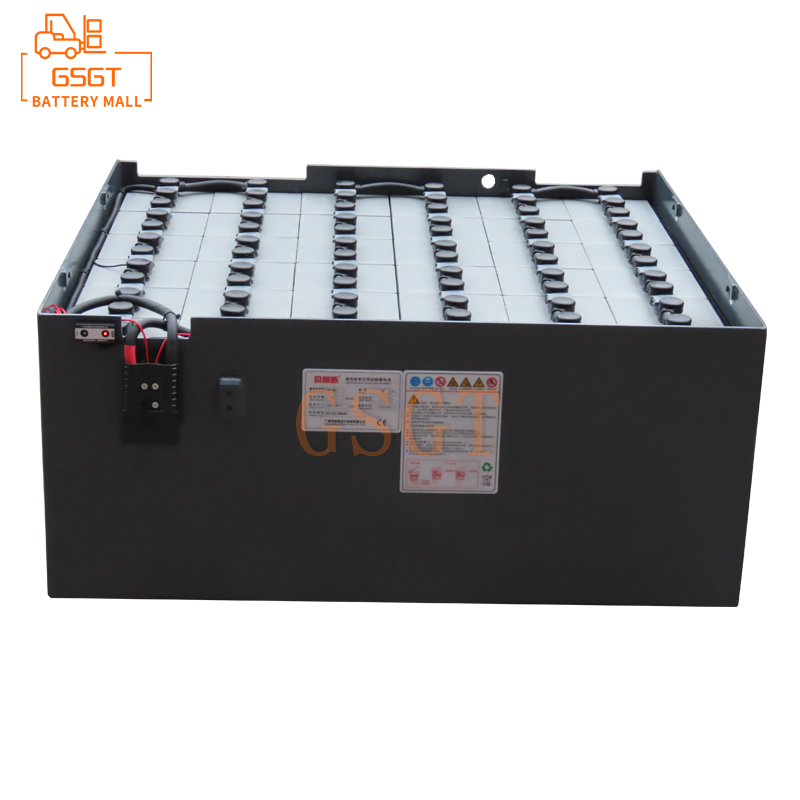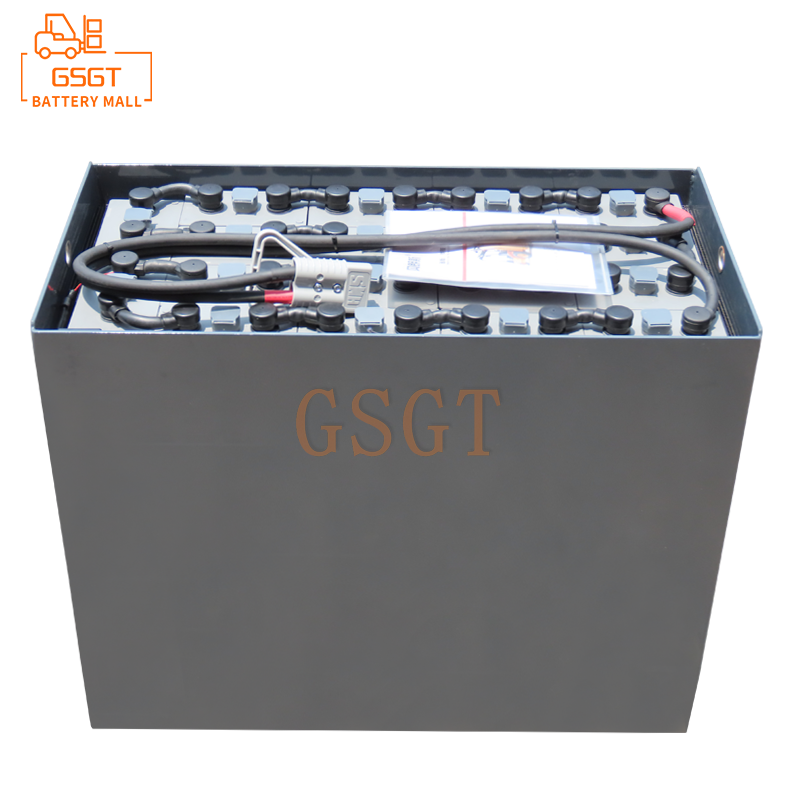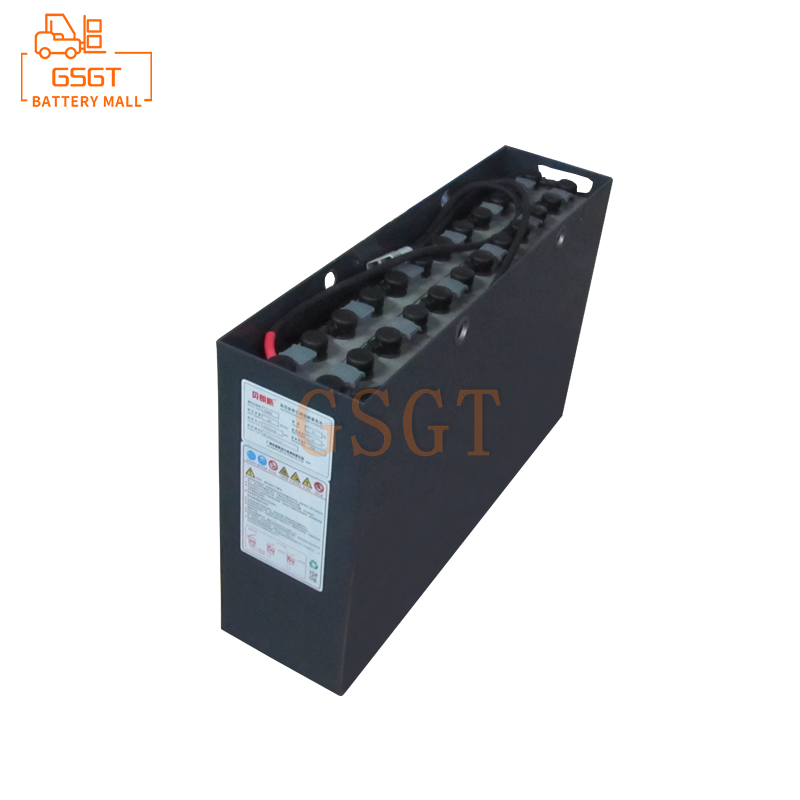Time:2025-04-28 09:49:52
Browse:746
In the field of modern logistics and industrial production, forklifts, as the core equipment for material handling, their operational efficiency is directly related to the operating costs and production benefits of enterprises. Lead-acid batteries, as one of the important power sources for forklifts, play a crucial role in achieving efficient forklift operations. From its unique working principle to outstanding performance characteristics and a complete maintenance system, lead-acid batteries, with their multi-dimensional advantages, provide a solid guarantee for the efficient and stable operation of forklifts.
The working principle and structural basis of lead-acid batteries
The working process of lead-acid batteries is based on complex and exquisite electrochemical reactions. Its interior is mainly composed of positive plates, negative plates, electrolyte and separators, etc. The active substance on the positive plate is lead dioxide, while the negative plate is spongy metallic lead. The electrolyte is usually a sulfuric acid solution of a certain concentration.
During the charging process, the external power supply inputs electrical energy to the battery, causing the lead dioxide on the positive plate to react with sulfuric acid, generating lead sulfate and releasing oxygen, while the lead sulfate on the negative plate is reduced to metallic lead. During the discharge stage, when the forklift is in operation, the battery outputs electrical energy outward. The lead sulfate on the positive and negative plates reacts with sulfuric acid again to regenerate lead dioxide and metallic lead. Electrons then flow from the negative electrode to the positive electrode through the external circuit, providing driving current for the forklift motor and achieving efficient conversion of chemical energy into electrical energy, thereby driving the forklift to operate. This reversible electrochemical reaction process enables lead-acid batteries to continuously charge and discharge during forklift operations, constantly providing power support for the forklift.
Performance advantages adapted to forklift operations
● Powerful and stable power output
Lead-acid batteries demonstrate powerful power output capacity in forklift operations, capable of meeting various working conditions such as heavy object handling, climbing slopes, and frequent starts and stops. Whether it is handling ton pallets of goods in a warehousing and logistics center or transferring raw materials and finished products in a factory workshop, lead-acid batteries can provide abundant and stable current, ensuring that forklifts can obtain strong torque at the moment they start, and easily complete the lifting, handling and loading/unloading operations of goods. Its stable output characteristics ensure the power stability of the forklift throughout the entire operation process, avoiding the impact on operation efficiency and cargo safety due to power fluctuations.
● Long battery life ensures continuous operation
High-capacity lead-acid batteries can provide forklifts with a longer driving range, enabling them to operate continuously for a long time after a single charge. In some large logistics warehouses or factories, forklifts need to operate continuously for long periods of time, and the long-range advantage of lead-acid batteries is fully demonstrated. Take the common lead-acid battery used in forklifts as an example. After a full charge, the forklift can work continuously for 6 to 8 hours or even longer, significantly reducing the downtime caused by charging, increasing the actual operating time of the forklift, and thereby enhancing the overall work efficiency.
● Good low-temperature performance ADAPTS to various environments
In some cold storage facilities, logistics sites in cold regions or winter operation environments, low temperature is often a key factor affecting the performance of equipment. Lead-acid batteries demonstrate good adaptability in this aspect. Compared with some other types of batteries, they can still maintain a certain performance level in low-temperature environments. Although the battery capacity will decrease as the temperature drops, lead-acid batteries can still provide sufficient power for forklifts due to their own characteristics, ensuring the normal operation of forklifts in low-temperature environments and maintaining the continuity of logistics and production activities.
Proper maintenance and care can extend the service life
● The importance of the correct charging method
The correct charging method is a key link in maintaining the performance of lead-acid batteries and extending their service life. First of all, it is necessary to select a suitable charger based on the battery specifications and the usage conditions of the forklift, and operate strictly in accordance with the charger's instructions. At the initial stage of charging, adopt an appropriate constant current charging method to ensure that the battery can smoothly receive the charging current. As the battery's power gradually increases, switch to constant voltage charging mode to prevent overcharging. At the same time, it is necessary to control the charging time well to avoid overcharging or undercharging. Generally, the charging time of lead-acid batteries should be controlled at about 8 to 10 hours. The specific duration can be adjusted according to the actual battery capacity and charging status.
● Inspection and maintenance of the electrolyte
The electrolyte, as the medium for the electrochemical reaction of lead-acid batteries, its state directly affects the battery performance. Regularly checking the electrolyte level is of vital importance. Under normal circumstances, the electrolyte level should be maintained at a certain height above the plates. If the level is too low, it may cause sulfation of the plates, reducing the battery capacity and lifespan. At this time, distilled water or special lead-acid battery replenishment fluid should be added in a timely manner. In addition, the density of the electrolyte should be regularly tested. By observing the density changes, the charging and discharging status as well as the health condition of the battery can be judged. Adjustments should be made based on the actual situation to ensure that the density of the electrolyte remains within the optimal working range, thereby maintaining the battery's good performance.
● Daily inspection and troubleshooting
In addition to charging and electrolyte maintenance, daily inspections of lead-acid batteries are also indispensable. Before and after each operation of the forklift, the operator should check whether there are any signs of damage or leakage on the battery's appearance, whether the terminal post connection is firm, and whether there is any oxidation or corrosion phenomenon, etc. If cracks are found in the battery casing or electrolyte leakage is detected, the use must be immediately stopped and professional maintenance or replacement carried out to prevent electrolyte leakage from causing damage to the equipment and the environment. For the oxide on the terminal post, it can be wiped clean with a damp cloth and an appropriate amount of protective grease can be applied to ensure good connection, reduce contact resistance and guarantee normal charging and discharging of the battery. At the same time, regular capacity tests and performance evaluations of the batteries should be conducted. By using professional equipment to detect the charging and discharging curves of the batteries, potential fault hazards can be identified in a timely manner, and maintenance or replacement measures can be taken in advance to avoid battery failures during operation, which may affect the normal operation of the forklift.
The technical development trend of lead-acid batteries in forklift operations
● Improve energy density and cycle life
To further meet the demand for efficient operation of forklifts, lead-acid battery technology is constantly evolving towards enhancing energy density and cycle life. By improving the formula of electrode materials, developing new additives, and optimizing the internal structure of batteries, the electrical energy stored per unit mass or volume of lead-acid batteries, that is, the energy density, can be increased. Higher energy density means that under the same volume or weight, the battery can store more electrical energy, providing forklifts with longer driving range and more sustained power support. Meanwhile, by improving the battery manufacturing process and chemical reaction mechanism, the corrosion resistance of battery plates and the stability of active substances can be enhanced, effectively extending the battery's cycle life, reducing the frequency of battery replacement, and lowering the operating costs of enterprises.
● The integrated application of intelligent management systems
With the rapid development of information technologies such as the Internet of Things and big data, the integration of intelligent management systems and lead-acid batteries has become a new trend. During forklift operations, by installing intelligent sensors on lead-acid batteries, key data such as voltage, current, temperature and remaining power of the batteries can be collected in real time and transmitted to the forklift management system or cloud platform. By leveraging big data analysis and intelligent algorithms, in-depth mining and analysis of battery data are conducted to achieve precise monitoring and predictive maintenance of battery status. For instance, the system can predict potential battery faults in advance based on the battery's historical data and real-time working conditions, promptly alerting maintenance personnel to conduct inspections and repairs, thus preventing forklifts from shutting down due to sudden battery failures. Meanwhile, the intelligent management system can also optimize the battery charging and discharging strategies based on the operation requirements of forklifts, improve battery utilization efficiency, and further ensure the efficient and stable operation of forklifts.
The comparative advantages over other battery types in forklift operations
● Cost-benefit aspect
In the selection of forklift power sources, cost is one of the important factors that enterprises consider. Lead-acid batteries have a significant advantage in terms of procurement costs. Compared with high-priced battery types such as lithium-ion batteries, they are more affordable. For small and medium-sized enterprises with limited budgets, using lead-acid batteries as the power source for forklifts can effectively reduce the cost of equipment purchase. In addition, during the usage process, although the charging efficiency of lead-acid batteries is relatively low and they require regular maintenance, considering their long service life and low maintenance costs comprehensively, the overall cost-effectiveness of lead-acid batteries throughout the entire forklift usage cycle is still considerable.
● Considerations of safety and stability
Safety is a key issue that cannot be ignored in forklift operations. After more than a hundred years of development and application, lead-acid batteries have mature and stable technology. Under normal usage and maintenance conditions, they have a relatively high level of safety. The electrochemical reactions inside it are relatively mild, and it is less likely to cause serious safety accidents such as thermal runaway, fire and explosion. At the same time, lead-acid batteries have relatively low requirements for the usage environment and can operate stably in conventional storage, industrial production and other environments. Even in some places with dust and high humidity, as long as proper protective measures are taken, lead-acid batteries can work reliably, providing stable power guarantee for forklift operations and reducing the operation risks caused by battery safety issues.
In conclusion, lead-acid batteries play an irreplaceable and crucial role in efficient forklift operations, thanks to the performance foundation laid by their unique working principle, the extended lifespan achieved through reasonable maintenance and care, the performance improvement brought about by the continuous development of technological trends, as well as the cost and safety advantages demonstrated when compared with other batteries. In the future, with the continuous innovation and improvement of technology, lead-acid batteries will continue to contribute to the efficient and stable operation of forklifts, facilitating the vigorous development of the logistics and industrial production sectors.

$2450

$4045

$2140

$1060

MESSAGE
Professional And Efficient
Security
Affordable Price
Professional Services